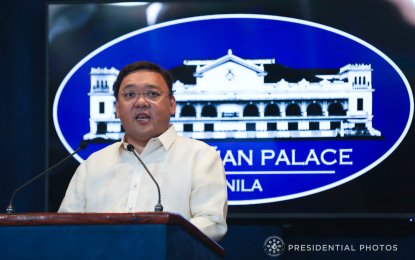Philippine News
Law on fake news singling out gov’t workers unconstitutional : Roque
MANILA – Presidential Spokesperson Harry Roque on Thursday said that a proposed law by Senator Grace Poe seeking to bar government employees from spreading fake news is unconstitutional, saying any law penalizing fake news should not be discriminatory.
“If we’re going to penalize fake news, who will judge what is fake news and what is news? Because the current framework right now, it’s the public that should be allowed to decide what is true from what is false,” Roque said during the continuation of the hearing of the Senate Committee on Public Information and Mass Media that Poe chairs.
The Palace official said that it is in his personal view that any law penalizing fake news “enjoys the presumption of unconstitutionality” and that it might be void for vagueness because nobody can say for certain what is truth from wat is false, which is especially true in the realm of international politics.
“Madam chair, I’ve been a victim of fake news. It comes with the territory. And we can only hope that because people were given by God the ability to discern what is true and what is false, its ultimately the public and the free market place of idea that should adjudge what the truth is and that should put ultimately the penalty on purveyors of fake news,” Roque said.
But Poe said that she is not proposing a new law since there is an existing law, the Revised Penal Code that already criminalizes misinformation or fake news.
“I’m sure you believe to yourself that although there’s a free market of ideas, we have to endeavor to always be responsible in ferreting out the truth. Do you agree sir?” Poe asked.
Roque answered “yes” but asserted that the proposed law “is additionally possibly infringing on equal protection because we are in effect singling out government employees.”
But Poe argued that her proposal “applies to all” except that government officials and employees are “held to a higher standard.”
She pointed out that unlike ordinary citizens, government employees are required to submit statement of liabilities and net worth and they can also be charged with graft and plunder.
“So there are certain things that are expected of us because we’ve waived that certain right because we are serving the people and we have to be able to be transparent, to be held to a higher standard,” she said.
For her part, lawyer Trixie Angeles said that social media accountability is already tilted against government employees and officials.
“With changing media platforms, bumibilis ang information, bumibilis ang ability natin to manipulate that information and there is increasing animosity (With the changing media platforms, information is getting faster and so does our ability to manipulate that information and there is increasing animosity),” Angeles said.
She said while there were laws on libel, the problem was bridging the gap between law enforcement and the crime itself.
“If somebody libels me on Facebook and I want to file against him/her, I can’t because I don’t have an address or it’s a fake account. Even if it’s somebody I do know, I can’t locate them or they are located at a different jurisdiction. So I have no recourse,” Angeles said.
She said that the primary concern on both parties – the administration and the opposition – “the question is that what do we do when somebody does us wrong and that wrong constitutes particular speech.”
“I think the public officers are the least of our concerns because we can bridge the gap very easily. The problem is the rest of the public,” Angeles said.
She said that since the internet is still considered such a “wild, wild West,” the ability to be able to enforce rules is determined largely by the platform like Facebook and Twitter among others.
Any actions to find the address of an offensive speech from a social media account, she said would also have to contend with the Data Privacy Act.
She cited the case of Thinking Pinoy, a known pro-administration blogger who was sued under the said law by just gathering information that is readily available on the internet.
“The enforcement of these particular laws is suddenly entered into vagueness. What we’re saying here is that this is a new area. We don’t know what we are doing for most of the part when it comes to enforcement of the laws,” Angeles said.






















